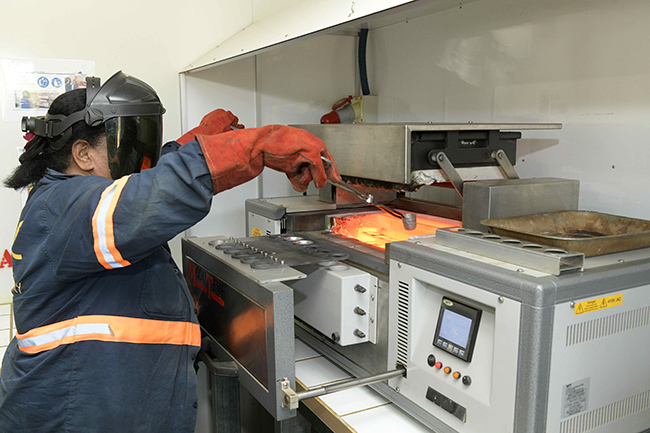SMSP’s strategy is based on the premise that a natural resource generates far more added value and therefore economic spin-offs when it is processed, rather than simply extracted and exported.
Thus, for each category of nickel ore, an appropriate value-adding model can multiply the returns in terms of added value.
It is on this basis that SMSP has entered into onshore and offshore partnerships, the first enabling it to make a profit from mining rich ore locally, and the second enabling it to process ore with a lower nickel content in a plant equipped accordingly in a territory other than New Caledonia.
SMSP is the majority shareholder in KONIAMBO NICKEL SAS, jointly owned with GLENCORE, and in SNNC and NMC, jointly owned with POSCO.
The aim of each of these partnerships is to gain a foothold in the metallurgy market in order to benefit from the higher added value generated by the sale of products processed in this way, i.e. ferronickel.
Thanks to this industrial strategy, 51% of the added value returns to the Territory through the dividends received by SMSP as a result of its majority shareholding.
This economic development model also creates jobs in New Caledonia to ensure the supply of ore to the offshore plant.
As a company owned by the public authorities, the SMSP group is in fact a tool at the service of the common interest.
This approach is reflected first and foremost in terms of employment. From 120 employees in 1990 to more than 2,500 direct jobs through its subsidiaries, SMSP is one of the leading employers in the region.
Furthermore, the Northern Plant activities, NMC and Cotransmine have generated a dynamic of initial and continuing training and professional reorientation. This activity has opened up new employment prospects for the local population in a variety of professions, with a real place for women in a traditionally male-dominated world.
These prospects are also reflected in subcontracting activities. These have developed very rapidly in the Northern and Southern Provinces. At a local level, the Usine du Nord also encourages the creation of businesses in local communities through the Groupement de Droit Particulier Local GDPL (Individual Grouping Right under local special law). These structures, endemic to New Caledonia, enable clans to develop an economic activity on customary land, or on the basis of the clan. A CEROM study carried out in 2015 estimates that three or even four indirect jobs are created for every direct job at the Usine du Nord.

